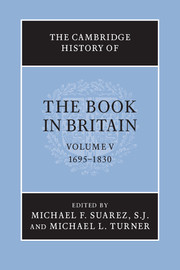Book contents
- Frontmatter
- Introduction
- PART I THE QUANTITY AND NATURE OF PRINTED MATTER
- PART II ECONOMIC, LEGAL AND CULTURAL CONTEXTS
- PART III THE TECHNOLOGIES AND AESTHETICS OF BOOK PRODUCTION
- PART IV THE BOOK TRADE AND ITS MARKETS
- V BOOKS AND THEIR READERS
- Abbreviations used in bibliography
- Bibliography
- Index
- Frontispiece
- Plate section
- References
44 - Law books
from III - SPECIALIST BOOKS AND MARKETS
Published online by Cambridge University Press: 28 September 2010
- Frontmatter
- Introduction
- PART I THE QUANTITY AND NATURE OF PRINTED MATTER
- PART II ECONOMIC, LEGAL AND CULTURAL CONTEXTS
- PART III THE TECHNOLOGIES AND AESTHETICS OF BOOK PRODUCTION
- PART IV THE BOOK TRADE AND ITS MARKETS
- V BOOKS AND THEIR READERS
- Abbreviations used in bibliography
- Bibliography
- Index
- Frontispiece
- Plate section
- References
Summary
Definitions
In January 1786, as he prepared for a mid-life career change from Scots advocate to English barrister, James Boswell ‘read in Blackstone for some days’. Some years later another Edinburgh lawyer hoped that William Blackstone’s Commentaries on the laws of England (Oxford, 1765–9), still regarded by English common lawyers as ‘the magnum opus of the eighteenth century’, might yield ‘a certain degree of Information in the English Laws’ to complement ‘the best Books (though we have none nearly so good) on Scots Jurisprudence’.
The title of this volume notwithstanding, there was – and arguably still is – no such thing as British law. While facilitating some cross-border traffic of cases and practitioners, the first Act of Union (6 Anne c. 11) preserved the autonomy of English common law and Scottish Roman or civilian legal institutions. Nor did the second union of 1800 incorporate Ireland’s transplanted common-law jurisdiction (39 & 40 George III c. 67), although appeals from Dublin, as from Edinburgh, went henceforth to the House of Lords at Westminster. Irish courts and lawyers followed precedents and procedures laid down by English law books, many of which were reprinted in Dublin, like the pirated 1775 ‘sixth’ edition of Blackstone’s Commentaries, since no copyright legislation applied in Ireland until 1801 (41 George III c. 107). Yet English and Irish law were not identical. The 1780s also saw the first printed volumes of Irish law reports since the early seventeenth century; these heralded ‘a profusion of nominate Irish reports’, while not immediately ending complaints about the fated oblivion of Irish judicial decisions. That eighteenth-century Irish law publishing involved more than merely reprints for export to England and its colonies is, however, indicated by the appearance of such works as Matthew Dutton’s Law of masters and servants in Ireland (Dublin, 1723), ‘the earliest textbook in English in the field of labour law’.
Information
- Type
- Chapter
- Information
- The Cambridge History of the Book in Britain , pp. 791 - 806Publisher: Cambridge University PressPrint publication year: 2009
References
Accessibility standard: Unknown
Why this information is here
This section outlines the accessibility features of this content - including support for screen readers, full keyboard navigation and high-contrast display options. This may not be relevant for you.Accessibility Information
- 1
- Cited by
